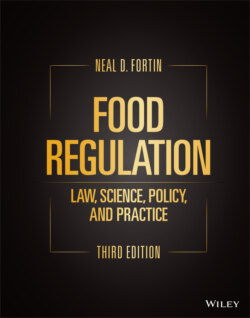Читать книгу Food Regulation - Neal D. Fortin - Страница 23
1.3.3 Regulations
ОглавлениеAlthough Congress and state legislatures have the primary authority to enact laws, they often delegate some of this authority to administrative agencies. This is particularly true for areas requiring technical expertise, such as health and science matters. The laws promulgated by administrative agencies are called regulations or administrative rules.
In theory, the administrative agencies merely execute the laws enacted by the legislature. However—because the legislatures often provide only a broad mandate—the agencies have considerable leeway in interpreting and applying their mandate. Typically, an administrative agency promulgates the detailed regulations that are necessary to translate the legislative mandate into operating standards. The regulations must fall under the scope of authority delegated by the legislature in statute. Regulations must also be consistent with other relevant constitutional and statutory requirements. Generally, regulations have the full force of law found in the enabling statute.
The executive branch agencies have increased in number, size, and importance since the 1930s. However, it is important to remember that the agencies can only carry out that which they are authorized to do by the legislature. In addition, the legislature determines the amount of funding the agencies receive. It is common for legislatures to enact popular statutes with noble sounding mandates but then fail to provide the necessary funds to agencies to carry out the new legislative mandate.
